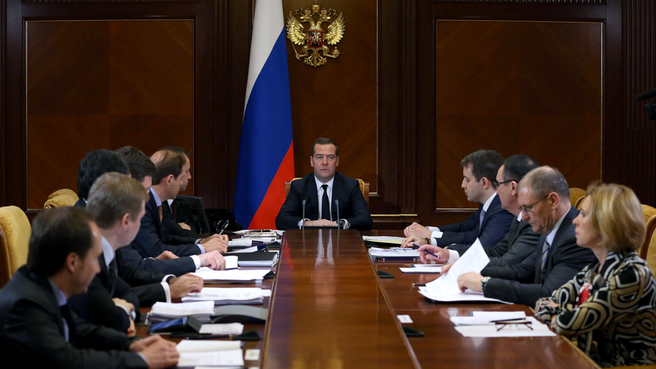Dmitry Medvedev: "The import substitution policy must be wise and well thought-out, and take into account, above all, our interests and our international commitments. And it must certainly account for cooperation ties with our partners, who have already invested in our industry and agriculture and brought in modern technologies."
An excerpt from Dmitry Medvedev’s opening remarks:
This year we must work out and implement import substitution
programmes in certain sectors of the economy. These include industrial
production, power generation, agriculture, and computer software.
By 1 July, we must adopt decisions to ensure the implementation of these programmes with due regard for the needs and capabilities of the regions.
Import substitution is our strategic priority for the coming years, regardless of any sanctions.
Our efforts to fill certain market niches with Russian goods fully meet our national interests.
We have created versatile government tools designed to support import substitution. These include subsidies, co-financing of research projects, different kinds of grants, and preferences in procurement. We have also created development institutes. Specialised infrastructure has been set up in the regions: industrial parks, business incubators. Similar things exist in virtually every rapidly developing region. We expect this work to result in the production of high-quality goods capable of competing with imported analogues.
For that to happen, we must ensure coordination at a federal level, focus our support on the most promising projects, get entrepreneurs interested in them, and invest money in higher quality or entirely new products.
No one is setting the task of total import substitution – that’s impossible, that would be going from one extreme into another. Nevertheless, we know that the level of government support, in all its forms, for domestic producers abroad is often considerably higher than in our country. Countries that opened their markets without any conditions often ended up losing whole sectors of their economy.
Let me remind you that the share of imports in our machine tool industry is approximately 90 percent, heavy machine building – around 70 percent, oil and gas equipment – 60 percent, power generating equipment – around 50 per cent, agricultural machine-building – from 50 to 90 percent, and so on. Even in the civil aircraft industry the share of imports is overwhelming – over 80 percent.
When we decided to build an open economy, or joined the World Trade Organisation, or delegated part of our authority within the framework of the Eurasian Economic Union to a supranational level, or embarked on import substitution – that was all our conscious choice.
The import substitution policy must be wise and well
thought-out, and take into account, above all, our interests and our
international commitments. And it must certainly account for cooperation ties
with our partners, who have already invested in our industry and agriculture
and brought in modern technologies.












